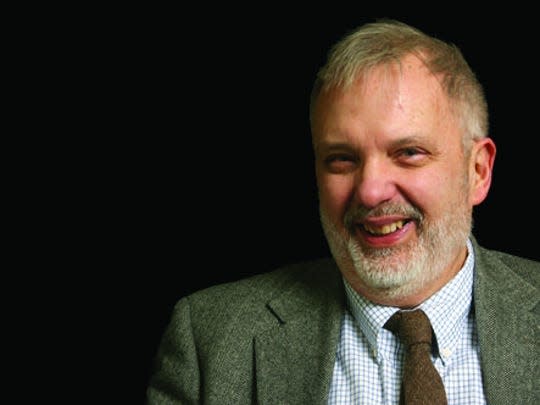Moving on from October
- Oops!Something went wrong.Please try again later.
I am glad to be in November. By and large, this October sucked.
However, mixed within the “by and large” -- the negative stuff -- I believe are some potential opportunities, at least some positive glimmers.
As long-term readers of this column know, my wife and I lost our truly wonderful son, George, in October three years ago. So, we anticipated this October with our usual mixture of bittersweet remembrance and regrets.
Working backwards timewise, the end of October and the news of the death of actor Matthew Perry after years of his fighting addictions, was an unwelcome reminder to me and likely all of us, of the challenge of mental illness and addictions. While it appears that Perry’s death came after several years of sobriety, it came less than a week after the self-inflicted death of the Maine shooter who was also apparently suffering from mental illness.

While I make no claim to any professional expertise in the mental health field, decades of working with our son as he struggled with his demons, coupled with now over fifty years of practicing law--most often dealing with clients and parties often stressed well beyond their capabilities -- has taught me to remain defiantly optimistic. Times change. Recognized mistakes of the past become renewed opportunities.
I cite the process of “deinstitutionalization,” being the replacement of massively ill-run psychiatric hospitals after World War II with community health clinics. I recall the Chief Justice Warren Burger led U.S. Supreme Court landmark ruling in O’Conner v. Donaldson (1975) which held that “a state cannot constitutionally confine a non-dangerous individual who is capable of surviving safely in freedom….” As the need to address mental health challenges has skyrocketed, and the facilities have been increasingly stressed and way too often unavailable, perhaps now is the time to carefully revisit the Donaldson decision and its progeny.
According to articles cited in Wikipedia’s “Deinstitutionalization in the United States, “The increase in homelessness was seen as related to deinstitutionalization. Studies from the late 1980 indicated that one-third to one-half of homeless people had severe psychiatric disorders, often co-occurring with substance abuse. In 1955, there were 340 psychiatric hospital beds for every 100,000 US citizens. In 2005, that number had diminished to 17 per 100,000…Heather MacDonald stated in City Journal [2009] ‘jails have become society’s primary mental institutions, few have the funding or expertise to carry out that role properly.”
As with other societal deadlocks, such as abortion, or same sex marriage, perhaps here is where the courts can take the lead and force the issue. Too many suffer on our streets and in our jails.
Of course, the penultimate challenge to a peaceful start to this past October occurred on Saturday, October 7, when Hamas terrorists brutally murdered Israelis and took more than 200 hostages. As expected, the result has been an attack by the Israeli army on the Gaza strip and largely worldwide condemnation of that action. As I detailed in my prior column, in my opinion the dispute was triggered in our relatively modern era by the 1917 Balfour Declaration. Palestinians deserve a homeland, as do Jews. I see three post-Hamas-in-Gaza problems, obviously not easily solved: dealing with Qatar and others harboring Hamas leaders; ensuring competent leadership in both Israel and in the Palestinian areas; and perhaps even more important and vexing, at the minimum keeping the Iranian mullahs and their proxies out of the way. After Hamas and their terrorist compatriots are gone and Iran contained, we need to push Israel to agree to a two-state solution.
However, returning to likely more realistic -- and clearly closer-to-home -- glimmers of optimism, I point to two very different recent comments.
Arnold Schwarzenegger recently warned against creating a "generation of wimps and weak people…," saying youth today are "over-babied." He thinks they need to be taught how to be tough.
In helpful juxtaposition, I point to an interview by CNN right after the Maine shooting. The CNN interviewer asked a father -- who had also lost a daughter to a car accident years before -- how he could forgive the shooter who just killed his son. While one can view the interview as implicitly revealing a clash between a secular and a religious perspective, I choose to simply listen to the inspiring words of the grieving father, Leroy Walker, Sr. Referring to the man who murdered his son he said, “I cannot hate this person.” And “if that person was in his right mind, he would be a loving person, just like us.”
I'm thankful Schwarzenegger reminded us that we are living in the home of the brave; and for Walker's reminder that we are also living in a country where forgiveness is an outstanding virtue.
Contact Larry Little at larrylittle46@gmail.com.
This article originally appeared on Kitsap Sun: Moving on from October